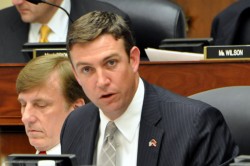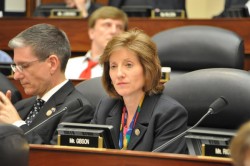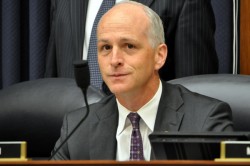National
House panel adopts anti-gay amendments in defense bill
Amendments reaffirm DOMA, could disrupt ‘Don’t Ask’ repeal


Rep. Duncan Hunter introduced an amendment that could disrupt 'Don't Ask' repeal (Blade photo by Michael Key)
A House defense committee approved on Wednesday a series of anti-gay amendments as part of major Pentagon budget legislation aimed at disrupting the process for repealing “Don’t Ask, Don’t Tell” and at demonstrating support for the Defense of Marriage Act.
The most high-profile amendment came from Rep. Duncan Hunter (R-Calif.), who introduced a measure that would expand the certification requirement needed for repeal to include input from the four military service chiefs. The Republican-controlled House Armed Services Committee voted 33-27 in favor of adopting the measure as part of the fiscal year 2012 defense authorization bill.
The vote in favor of the Hunter amendment was mostly along party lines, although Reps. Todd Platts (R-Pa.) and Chris Gibson (R-N.Y.) voted against the measure. Rep. Mike McIntyre (D-N.C.) was the sole Democrat to vote in favor of the measure.
The repeal legislation signed into law in December allows for repeal of “Don’t Ask, Don’t Tell” after 60 days pass following certification from the president, the defense secretary and the chair of the Joint Chiefs of Staff. Hunter’s amendment would expand the certification requirement to include input from the uniform chiefs of staff for the Army, Navy, Air Force and Marine Corps.
Hunter, a Marine Corps veteran of Iraq and Afghanistan, billed the amendment as a means to ensure the uniform military leaders — which he described “the ones that are actually responsible for the men and women under their care” — are able to express their opinion before moving forward with “Don’t Ask, Don’t Tell” repeal.
“Right now as it stands, the only folks that have to sign on to this are the president, who has never been to war or in ground combat, Adm. [Mike] Mullen, who, with all due respect to him, has never been to ground combat in Iraq or Afghanistan, and Secretary Gates, a political appointee, who is a very fine gentleman, but has never been in ground combat in Iraq or Afghanistan,” Hunter said. “I, and others in this room, have more combat experience than the people who would sign off on the repeal of ‘Don’t Ask, Don’t Tell.'”
Hunter emphasized his amendment would require the service chiefs to issue certification only based on their belief that “Don’t Ask, Don’t Tell” repeal wouldn’t harm morale and unit cohesion for combat arms units under their jurisdiction. According to the Pentagon survey published in November, these units are the most skeptical about whether open service would cause a disruption in the U.S. military.
Involving the military service chiefs in the “Don’t Ask, Don’t Tell” repeal certification process could disrupt or delay open service in the U.S. military because some uniform leaders of the military — notably Marine Corps Commandant Gen. James Amos — expressed opposition to passing repeal legislation last year. Amos has since said the Marine Corps would work to implement open service.
Despite the concerns that were expressed last year, each of the service chiefs testified in April that the process for enacting “Don’t Ask, Don’t Tell” repeal has been proceeding smoothly. Some service chiefs — including Chief of Naval Operations Adm. Gary Roughead — have said they oppose any effort to expand the certification requirement and they believe the defense secretary would adequately represent their views in the certification process.
Many Republican committee members voiced support for the Hunter amendment as they expressed opposition to implementing open service in the U.S. military.
Rep. Doug Lamborn (R-Colo.) said he supported the amendment because the president, the defense secretary and the chairman of the Joint Chiefs of Staff had already backed “Don’t Ask, Don’t Tell” repeal before Congress acted to end the military’s gay ban.
“I always felt the deck was stacked when the three people who were supposed to sign off on it, agreed to and had all been on record ahead of time saying what their preference was,” Lamborn said. “This broadens it, and, I think, adds more objectivity to the whole matter, and I think that that’s really good thing.”
Rep. Steve Palazzo (R-Miss.) said he opposes “Don’t Ask, Don’t Tell” repeal because he hasn’t encountered one American or U.S. service member who wants an end to the anti-gay law. Despite his remarks, polls found that around 80 percent of Americans favored ending the military’s gay ban at the time Congress repealed the statute.
Palazzo added he had a visit earlier today from about 85 veterans of World War II and said he believes they’d be displeased with “Don’t Ask, Don’t Tell” repeal.
“I don’t think that they would look upon this as progress,” Palazzo said. “I don’t think they’d look at this as the sacrifices they made for our families, for our country, for our allies, future generations of Americans — to see their military go down in flames by implementing [an end] to the DADT policy. Our men and women in uniform deserve better.”
But Democrats on the committee defended repeal of the law that Congress passed last year and said the current repeal process is working well.
Rep. Adam Smith (D-Wash.), ranking Democrat on the House Armed Services Committee, said the Hunter amendment troubled him because it suggests the president and the defense officials identified in the repeal law aren’t capable of making critical defense decisions.
“It’s a very, very dangerous thing to say that the president of the United States, the commander in chief; the secretary of defense; and the chairman of the Joint Chiefs of Staff are somehow not quite qualified to make important military decisions,” Smith said. “These are the same people that decide whether or not we go to war. They made a decision on whether or not to kill Osama bin Laden.”
Rep. Chellie Pingree (D-Maine) directly responded to the view expressed by Palazzo that World War II veterans would be unhappy with “Don’t Ask, Don’t Tell” repeal.
“Let’s not fool ourselves,” Pingree said. “Some of those soldiers were gay as well, and many of them took a long time to admit to that, or come out on that, but they’ve all been courageous in doing so and I think that they can’t be characterized as a generation that doesn’t want to see this change in the military.”
Although the committee adopted the amendment as part of defense authorization, passing such a provision into law would be challenging because the Senate would have to agree to it during conference negotiations and Obama would have to sign the measure.
Further, defense officials have testified that certification could happen mid-summer, and the final version of the defense authorization will likely not reach the president’s desk until after that time, rendering Hunter’s provision useless.
Alex Nicholson, executive director of Servicemembers United, expressed skepticism that the adoption of the Hunter amendment would impair the U.S. military’s ability to move toward open service.
“Despite the passage of this amendment within the ever-hostile House Armed Services Committee, it is highly unlikely that such an amendment would ever pass the Senate and be signed by the president,” Nicholson said. “The offering of this amendment was a shameful and embarrassing waste of time. The service chiefs have unequivocally said that they do not want this extra burden forced upon them, so if Congress really values their advice on this issue they should take it and forget this unnecessary and unwanted amendment.”
Hunter’s amendment was one of three anti-gay amendments the House Armed Services Committee approved on Wednesday as part of the defense authorization bill. Other measures affirmed the panel’s commitment to DOMA, which prohibits federal recognition of same-sex marriage.
The DOMA-related amendments were apparently inspired by Navy guidance on same-sex marriage that was made public this week.The guidance, which is dated April 13 and signed by Chief of Navy Chaplains Rear Adm. Mark Tidd, indicated military bases could be used for same-sex marriage ceremonies in states where such unions are legal and that Navy chaplains can officiate same-sex marriage ceremonies if they so choose.
However, following an outcry from conservatives, the Navy rescinded the guidance and said further legal review on the issue was necessary.
Rep. W. Todd Akin (R-Mo.) introduced an amendment mandating that marriage ceremonies on military installations must comply with DOMA and that chaplains can only officiate in their official capacity over such ceremonies if they comply with the anti-gay law.
The committee adopted the amendment as part of the Pentagon budget legislation by a vote of 38-23. Republican members of the panel were unanimous in their support for the measure. Reps. McIntyre, Larry Kissell (D-N.C.) and Mark Critz (D-Pa.) joined with the GOP to vote in favor of the amendment.
Akin said the amendment was necessary because he believes the recent Navy guidance demonstrates that the U.S. military was willing to skirt federal law.
“There is a federal law on the books and the military has decided they’re going to ignore that law,” Akin said. “That’s a very serious question. Does that mean that the law code on our books is an a la carte menu? Does that mean that the military can decide they’re going to change the rules of engagement and how they’re going to interrogate prisoners or [enforce] whatever particular law suits their fancy?”
Rep. Susan Davis (D-Calif.), who opposed the amendment, said the Navy guidance was the result of the Pentagon looking at how the U.S. military would look after “Don’t Ask, Don’t Tell.”
“We asked them to deal with these issues and to speak specifically to them,” Davis said. “So, when a facility is made available to such events, individuals who meet all the requirements for use of those facilities should not be denied access to the facility because of sexual orientation.”
Davis added the amendment restricts the right of chaplains to exercise freely their religious beliefs if they want to officiate at same-sex marriage ceremonies.
“Many chaplains represent faith traditions in which marriages between same-sex couples are celebrated and to prohibit them from doing so — to do that would be an attack on their rights with this amendment,” Davis said.
Although the Navy has said it will revisit the guidance, Davis said she’s confident the service will reach the same conclusion it had come to before.

Rep. Vicky Hartzler introduced an amendment to ensure DOD policies comply with DOMA (Blade photo by Michael Key)
Another amendment came from Rep. Vicky Hartzler (R-Mo.), whose measure restated that the definition of marriage under DOMA as a union between one man and one woman applies to Defense Department regulations and policies.
The panel adopted the measure as part of the defense authorization bill by a vote of 39-28. The Republican members of the panel were unanimous in their support. Reps. McIntyre, Kissell and Silvestre Reyes (D-Texas) as well as Del. Madeleine Bordallo (D-Guam) joined the GOP to vote in favor of the measure.
Hartzler said the intention of the amendment was to reaffirm congressional support for DOMA and opposition to same-sex marriage.
“I think that this is a time for us in this Congress, the 112th Congress, to give our stance that we believe this is a wise policy and that marriage should be between a man and a woman,” she said.
But Smith, who opposed the measure, disputed the idea that the federal government should be involved in state regulation of marriage and questioned why the committee was taking up the issue when the panel’s area of jurisdiction is the U.S. military.
“I don’t think we need to be inserting into the Defense Authorization Act a Congress-wide view on how marriage should be defined, however we may feel,” Smith said.
Aubrey Sarvis, executive director of the Servicemembers Legal Defense Network, was particularly critical of what he said was invoking the more controversial debate over marriage in an attempt to derail “Don’t Ask, Don’t Tell” repeal.
“These adopted amendments to delay and derail repeal are a partisan political attempt to interject the same-sex marriage debate and other unrelated social issues into the NDAA where they have no place,” Sarvis said. “Make no mistake — these votes should be a wake-up call to supporters of open service that our work is not done. Our commitment to timely certification and repeal must be redoubled as we move to the House floor to defend the progress we have made to ensure that LGB patriots can defend and serve the country they love with honesty and integrity.”
Another anticipated anti-gay amendment didn’t see introduction before the committee on Wednesday. Palazzo was expected to introduce an amendment that would require conscience regulations for service members who have religious or moral objections to open service. His office didn’t immediately respond to the Washington Blade’s request for comment on why the measure wasn’t introduced.
After adopting the anti-gay amendments, the committee voted to report out the defense authorization bill to the floor by a vote of 60-1. Rep. John Garamendi (D-Calif.) was the sole panel member to vote against the legislation.
The Republican-controlled House will likely pass the defense authorization bill as a whole when the measure reaches the floor. A vote on the legislation could happen as soon as the week of May 23.
U.S. Supreme Court
Supreme Court to consider bans on trans athletes in school sports
27 states have passed laws limiting participation in athletics programs

The U.S. Supreme Court on Thursday agreed to hear two cases involving transgender youth challenging bans prohibiting them from participating in school sports.
In Little v. Hecox, plaintiffs represented by the ACLU, Legal Voice, and the law firm Cooley are challenging Idaho’s 2020 ban, which requires sex testing to adjudicate questions of an athlete’s eligibility.
The 9th U.S. Circuit Court of Appeals described the process in a 2023 decision halting the policy’s enforcement pending an outcome in the litigation. The “sex dispute verification process, whereby any individual can ‘dispute’ the sex of any female student athlete in the state of Idaho,” the court wrote, would “require her to undergo intrusive medical procedures to verify her sex, including gynecological exams.”
In West Virginia v. B.P.J., Lambda Legal, the ACLU, the ACLU of West Virginia, and Cooley are representing a trans middle school student challenging the Mountain State’s 2021 ban on trans athletes.
The plaintiff was participating in cross country when the law was passed, taking puberty blockers that would have significantly reduced the chances that she could have a physiological advantage over cisgender peers.
“Like any other educational program, school athletic programs should be accessible for everyone regardless of their sex or transgender status,” said Joshua Block, senior counsel for the ACLU’s LGBTQ and HIV Project. “Trans kids play sports for the same reasons their peers do — to learn perseverance, dedication, teamwork, and to simply have fun with their friends,” Block said.
He added, “Categorically excluding kids from school sports just because they are transgender will only make our schools less safe and more hurtful places for all youth. We believe the lower courts were right to block these discriminatory laws, and we will continue to defend the freedom of all kids to play.”
“Our client just wants to play sports with her friends and peers,” said Lambda Legal Senior Counsel Tara Borelli. “Everyone understands the value of participating in team athletics, for fitness, leadership, socialization, and myriad other benefits.”
Borelli continued, “The U.S. Court of Appeals for the Fourth Circuit last April issued a thoughtful and thorough ruling allowing B.P.J. to continue participating in track events. That well-reasoned decision should stand the test of time, and we stand ready to defend it.”
Shortly after taking control of both legislative chambers, Republican members of Congress tried — unsuccessfully — to pass a national ban like those now enforced in 27 states since 2020.
Federal Government
UPenn erases Lia Thomas’s records as part of settlement with White House
University agreed to ban trans women from women’s sports teams

In a settlement with the Trump-Vance administration announced on Tuesday, the University of Pennsylvania will ban transgender athletes from competing and erase swimming records set by transgender former student Lia Thomas.
The U.S. Department of Education’s Office for Civil Rights found the university in violation of Title IX, the federal rights law barring sex based discrimination in educational institutions, by “permitting males to compete in women’s intercollegiate athletics and to occupy women-only intimate facilities.”
The statement issued by University of Pennsylvania President J. Larry Jameson highlighted how the law’s interpretation was changed substantially under President Donald Trump’s second term.
“The Department of Education OCR investigated the participation of one transgender athlete on the women’s swimming team three years ago, during the 2021-2022 swim season,” he wrote. “At that time, Penn was in compliance with NCAA eligibility rules and Title IX as then interpreted.”
Jameson continued, “Penn has always followed — and continues to follow — Title IX and the applicable policy of the NCAA regarding transgender athletes. NCAA eligibility rules changed in February 2025 with Executive Orders 14168 and 14201 and Penn will continue to adhere to these new rules.”
Writing that “we acknowledge that some student-athletes were disadvantaged by these rules” in place while Thomas was allowed to compete, the university president added, “We recognize this and will apologize to those who experienced a competitive disadvantage or experienced anxiety because of the policies in effect at the time.”
“Today’s resolution agreement with UPenn is yet another example of the Trump effect in action,” Education Secretary Linda McMahon said in a statement. “Thanks to the leadership of President Trump, UPenn has agreed both to apologize for its past Title IX violations and to ensure that women’s sports are protected at the university for future generations of female athletes.”
Under former President Joe Biden, the department’s Office of Civil Rights sought to protect against anti-LGBTQ discrimination in education, bringing investigations and enforcement actions in cases where school officials might, for example, require trans students to use restrooms and facilities consistent with their birth sex or fail to respond to peer harassment over their gender identity.
Much of the legal reasoning behind the Biden-Harris administration’s positions extended from the 2020 U.S. Supreme Court case Bostock v. Clayton County, which found that sex-based discrimination includes that which is based on sexual orientation or gender identity under Title VII rules covering employment practices.
The Trump-Vance administration last week put the state of California on notice that its trans athlete policies were, or once were, in violation of Title IX, which comes amid the ongoing battle with Maine over the same issue.
New York
Two teens shot steps from Stonewall Inn after NYC Pride parade
One of the victims remains in critical condition

On Sunday night, following the annual NYC Pride March, two girls were shot in Sheridan Square, feet away from the historic Stonewall Inn.
According to an NYPD report, the two girls, aged 16 and 17, were shot around 10:15 p.m. as Pride festivities began to wind down. The 16-year-old was struck in the head and, according to police sources, is said to be in critical condition, while the 17-year-old was said to be in stable condition.
The Washington Blade confirmed with the NYPD the details from the police reports and learned no arrests had been made as of noon Monday.
The shooting took place in the Greenwich Village neighborhood of Manhattan, mere feet away from the most famous gay bar in the city — if not the world — the Stonewall Inn. Earlier that day, hundreds of thousands of people marched down Christopher Street to celebrate 55 years of LGBTQ people standing up for their rights.
In June 1969, after police raided the Stonewall Inn, members of the LGBTQ community pushed back, sparking what became known as the Stonewall riots. Over the course of two days, LGBTQ New Yorkers protested the discriminatory policing of queer spaces across the city and mobilized to speak out — and throw bottles if need be — at officers attempting to suppress their existence.
The following year, LGBTQ people returned to the Stonewall Inn and marched through the same streets where queer New Yorkers had been arrested, marking the first “Gay Pride March” in history and declaring that LGBTQ people were not going anywhere.
New York State Assemblywoman Deborah Glick, whose district includes Greenwich Village, took to social media to comment on the shooting.
“After decades of peaceful Pride celebrations — this year gun fire and two people shot near the Stonewall Inn is a reminder that gun violence is everywhere,” the lesbian lawmaker said on X. “Guns are a problem despite the NRA BS.”
-

 U.S. Supreme Court4 days ago
U.S. Supreme Court4 days agoSupreme Court to consider bans on trans athletes in school sports
-

 Out & About4 days ago
Out & About4 days agoCelebrate the Fourth of July the gay way!
-

 Virginia4 days ago
Virginia4 days agoVa. court allows conversion therapy despite law banning it
-

 Opinions5 days ago
Opinions5 days agoCan we still celebrate Fourth of July this year?













